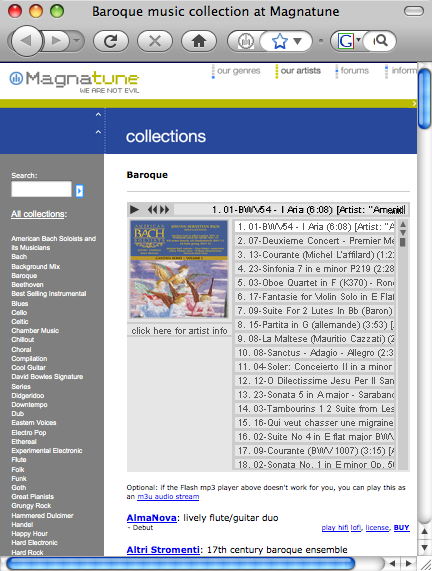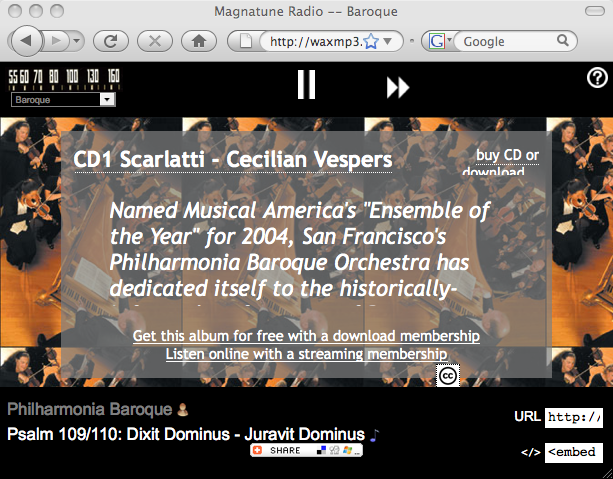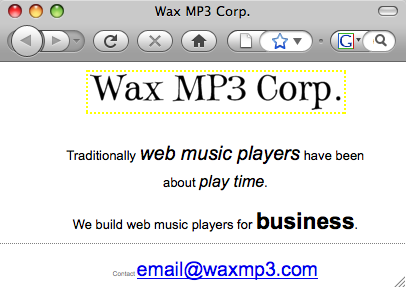Indie Music Tech has posted a mini-interview about Wax MP3. Thanks to Duncan Freeman of Band Metrics for making it happen.
Month: June 2009
he could play
Michael Jackson was a real musician. He had talent out the ass. Amazing time, tone, phrasing, energy, and style, not to mention pitch, range, projection, and every other musical gift that a pop singer needs or wants.
He personified big budget mega stars. The musical world that he dominated so utterly was disappearing before his eyes. The new one demands warmer and more intimate personas, the opposite of his grandiose narcissism:
He was a joke.
He was a sentimental fraud. Songs like “We Are the World” are terrible rock bottom drech. You cannot suck worse.
At the end he was not as rich as he used to be.
He personified self-loathing.
But he was an untouchable musician. The guy could play.
the new shiny disc
Jay Fienberg of HereJam: The web page is the new shiny disc
the new release is (going to be) all about how the music appears on / across the web.
The files and discs are almost irrelevant—definitely secondary. They do need to exist, but, really, once they are published, anyone can get them anywhere. But, the player / interface is primary, because it’s actually about that “content” that is the music—about getting into that music.
musician’s new music + record label’s new player = a new release
the player itself is the new format for music. And, rather than it being a single / fixed format, it is instead of the web (e.g., like a website—it is a web page or website). Each player can be distinctive in design, but all players will have at least a few common, idiomatic, elements that make it similar to other players. They marry idioms of the web with idioms of the music player—both provide nearly unlimited opportunities for design—for being turned into products.
You’ll know it’s a music player when you see it (e.g., maybe it has something to click to make it play), but the player format can be totally free to be any kind of web page(s), which can have original and distinctive shapes, structures, semantics, contexts, interactions, looks, feels, etc. The web page is the new shiny disc.
using permissive licensing effectively
Jonathan Bailey at Plagarism Today: Is Creative Commons Right For You?
I recommend Creative Commons to almost everyone I meet and actively discourage people from creating their own licenses.
However, this doesn’t mean that CC is for everyone. Not everyone who posts their work online is a good candidate for CC nor should they use it. Not only can it hurt your livelihood, but using it incorrectly might also damage the Creative Commons cause by letting people walk away with an unwarranted negative impression of the licenses.
This is why, before putting the CC logo on your site and announcing your new terms, it is important to take a minute and ask yourself if it is really right for you.
Having the skill to use open licensing effectively is a big part of succeeding. Different licenses have different impacts. Depending on what you’re trying to accomplish and what the market wants, your choice of license can sink your project or help it take off.
Wax MP3 player for Magnatune
I’m happy to release a piece of work that I like a lot — the Wax MP3 player for the Magnatune catalog.
The Wax MP3 player is a common codebase for semi-customized music players. The first one of these projects was Fresh Hot Radio, a curated set of links to net-born electronic music under a libre or feels-free license. That came out back in March.
The new project presents the Magnatune label‘s existing catalog in a new way. Compare and contrast these two presentations of the same baroque music catalog on Magnatune.com.

The Wax MP3 page for Magnatune’s baroque music:

What’s it all about? Think of it as Ubuntu for Creative Commons music. In the same way that Ubuntu delivers user friendliness for Linux desktops, the Wax MP3 player is able to do a sleek and simple listening experience with netmusic.
I hope you dig it. If not, and if you see any bugs, send an email to email@waxmp3.com.
Magnatune founder John Buckman has a blog entry about this new Waxna Mag MP3 Tune experience. Check it out.
It’s great to work with such an enlightened music business as Magnatune. I know that’s the most obvious thing in the world if you know them, but even when you know it you don’t really know it until you get up close. This whole deal is really built on their openness and calm confidence.
While I’ve been working in this project I’ve been really getting into Magnatune’s classical catalog. AFAIK there’s nobody on the open web even close to their level. Here are my favorite “stations” on the new Wax MP3 player for Magnatune:
Wax MP3 Corp. is the new company. No doubt I’ll waste buckets of electrons writing about in the long run, but for today I’ll leave it to the company home page to explain it this way:

Echo Nest API
The Echo Nest web music API is fairly awe inspiring. For example, they have a web service to detect the sections of a song — bridge, chorus, etc. — given only an MP3. What it amounts to is a bot capable of doing semantic analysis of a sound file.
One thing you could do with it is to distinguish spoken word from music files. A hosting service could then automatically reject music but allow talk, which would control its legal liability.
All in all it’s a radical level of power for the kind of lightweight apps that use third party web services.
One complaint so far: the web service returns XML, but the XML isn’t in a namespace. This will cause pain down the road, and it can easily be alleviated by adding an xmlns=”http://echonest” attribute to the root element.
fuck who-oah bands
grooveshark #2
One of the grooveshark folks stopped in at the comments on my post about their not giving attribution to link sources to say that this makes no sense because they don’t link out at all. They’re not a search engine like Seeqpod, they’re a hosting site like YouTube and (originally) iMeem.
I can only cop to retardation, though I swear Hypebot made me that way.
groove shark
Groove Shark is a search engine, yeah, in that it indexes free range MP3s and helps searchers get to them. But it never exposes the remote URLs, much less the originating web page.
As far as a searcher is concerned the MP3 is hosted by groove shark. When somebody hosts an MP3 they almost always want to be acknowledged, and more often than not they’re doing it to generate page views as much as plays. For grooveshark to sabotage their goals is bad faith.
Why be rude when you can so easily avoid it? How cynical do you have to be to care that little?
Seeqpod also made it hard for searchers to leave their site, but at least they gave attribution to their source hosts by showing the remote URL.
It has always been media apocalypse. It will always be media apocalypse.
Greg Borenstein in the conversation about the apocalypse of the media industries
:
The future composts the past. Someone said that once. Things don’t just go away, they get re-purposed and recycled with new cultural uses. How long ago did TV kill radio? There was a time when families would gather round the crystal set for an evening’s entertainment. What about movies. There was a time in the teens and twenties when more than a million people went to a movie every week. More people bought tickets for Gone with the Wind in American theaters than any other movie since. Radio’s still here; movies are still here. Radio became wallpaper for the car. Movies were for date nights, then for big costumed openings, like 17th century balls.
The confusing thing is that when we think of a medium, we tend to combine the physical format and the social function into one thing in our heads. So, when the social function or meaning changes without an equivalent tangible change to the format, we get confused. The medium has died, but still lives. Zombie Media.
But these changes are amazingly common. While we can argue about whether the internet is a bigger deal than TV or the printing press or fire, we’ve gone through other Zombifications pretty much every twenty years like clockwork for most of the recent past. Let’s just take movies: in the 90s, the hyper-blockbuster went global; in the 70s, the studios went bankrupt and VHS was invented; in the 50s, the studios went bankrupt and TV was invented; in the 30s, the studios went bankrupt and the movie star was invented; etc. Throughout that whole time, absolute movie attendance was falling precipitously while other parallel reinforcing business models were being invented, rising, and falling. And movies’ cultural meaning changed dramatically from disposable mainstream distraction, to national popular entertainment, to rarefied foreign art, to international media spectacle.
If we release our false sense of media stability, things seem a lot less chaotic. These changes will never be resolved. No medium has ever actually been stable for any significant amount of time. We’re constantly reinventing what our physical media mean to us: economically, creatively, culturally. Twas ever thus and twill ever be.
